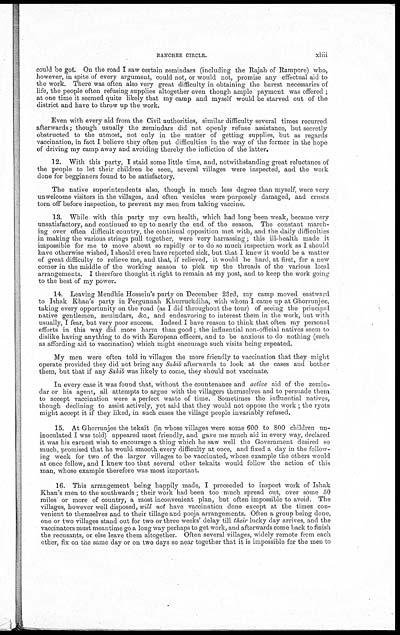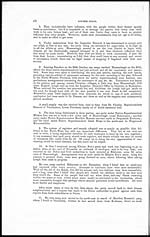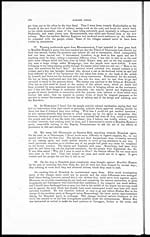Medicine - Vaccination > 1869-1873 - Report on vaccination in the Province of Bengal > Report on vaccination proceedings throughout the Government of Bengal with an appendix for the year ending 31st March 1869
(49) Page xliii
Download files
Individual page:
Thumbnail gallery: Grid view | List view

RANCHEE CIRCLE. xliii
could be got. On the road I saw certain zemindars (including the Rajah of Rampore) who,
however, in spite of every argument, could not, or would not, promise any effectual aid to
the work. There was often also very great difficulty in obtaining the barest necessaries of
life, the people often refusing supplies altogether even though ample payment was offered ;
at one time it seemed quite likely that my camp and myself would be starved out of the
district and have to throw up the work.
Even with every aid from the Civil authorities, similar difficulty several times recurred
afterwards; though usually the zemindars did not openly refuse assistance, but secretly
obstructed to the utmost, not only in the matter of getting supplies, but as regards
vaccination, in fact I believe they often put difficulties in the way of the former in the hope
of driving my camp away and avoiding thereby the infliction of the latter.
12. With this party, I staid some little time, and, notwithstanding great reluctance of
the people to let their children be seen, several villages were inspected, and the work
done for begginners found to be satisfactory.
The native superintendents also, though in much less degree than myself, were very
unwelcome visitors in the villages, and often vesicles were purposely damaged, and crusts
torn off before inspection, to prevent my men from taking vaccine.
13. While with this party my own health, which had long been weak, became very
unsatisfactory, and continued so up to nearly the end of the season. The constant march-
ing over often difficult country, the continual opposition met with, and the daily difficulties
in making the various strings pull together, were very harrassing; this ill-health made it
impossible for me to move about so rapidly or to do so much inspection work as I should
have otherwise wished, I should even have reported sick, but that I knew it would be a matter
of great difficulty to relieve me, and that, if relieved, it would be hard, at first, for a new
comer in the middle of the working season to pick up the threads of the various local
arrangements. I therefore thought it right to remain at my post, and to keep the work going
to the best of my power.
14. Leaving Mendhie Hossein's party on December 23rd, my camp moved eastward
to Ishak Khan's party in Pergunnah Khurruckdiha, with whom I came up at Ghorrunjce,
taking every opportunity on the road (as I did throughout the tour) of seeing the principal
native gentlemen, zemindars, &c, and endeavoring to interest them in the work, but with
usually, I fear, but very poor success. Indeed I have reason to think that often my personal
efforts in this way did more harm than good; the influential non-official natives seem to
dislike having anything to do with European officers, and to be anxious to do nothing (such
as affording aid to vaccination) which might encourage such visits being repeated.
My men were often told in villages the more friendly to vaccination that they might
operate provided they did not bring any Sahib afterwards to look at the cases and bother
them, but that if any Sahib was likely to come, they should not vaccinate.
In every case it was found that, without the countenance and active aid of the zemin-
dar or his agent, all attempts to argue with the villagers themselves and to persuade them
to accept vaccination were a perfect waste of time. Sometimes the influential natives,
though declining to assist actively, yet said that they would not oppose the work ; the ryots
might accept it if they liked, in such cases the village people invariably refused.
15. At Ghorrunjee the tekait (in whose villages were some 600 to 800 children un-
inoculated I was told) appeared most friendly, and gave me much aid in every way, declared
it was his earnest wish to encourage a thing which he saw well the Government desired so
much, promised that he would smooth every difficulty at once, and fixed a day in the follow-
ing week for two of the larger villages to be vaccinated, whose example the others would
at once follow, and I knew too that several other tekaits would follow the action of this
man, whose example therefore was most important.
16. This arrangement being happily made, I proceeded to inspect work of Ishak
Khan's men to the southwards ; their work had been too much spread out, over some 50
miles or more of country, a most inconvenient plan, but often impossible to avoid. The
villages, however well disposed, will not have vaccination done except at the times con-
venient to themselves and to their tillage and pooja arrangements. Often a group being done,
one or two villages stand out for two or three weeks' delay till their lucky day arrives, and the
vaccinators must meantime go a long way perhaps to get work, and afterwards come back to finish
the recusants, or else leave them altogether. Often several villages, widely remote from each
other, fix on the same day or on two days so near together that it is impossible for the men to
Set display mode to: Large image | Zoom image | Transcription
Images and transcriptions on this page, including medium image downloads, may be used under the Creative Commons Attribution 4.0 International Licence unless otherwise stated. ![]()
| Permanent URL | https://digital.nls.uk/91534770 |
|---|
| Additional NLS resources: | |
|---|---|




